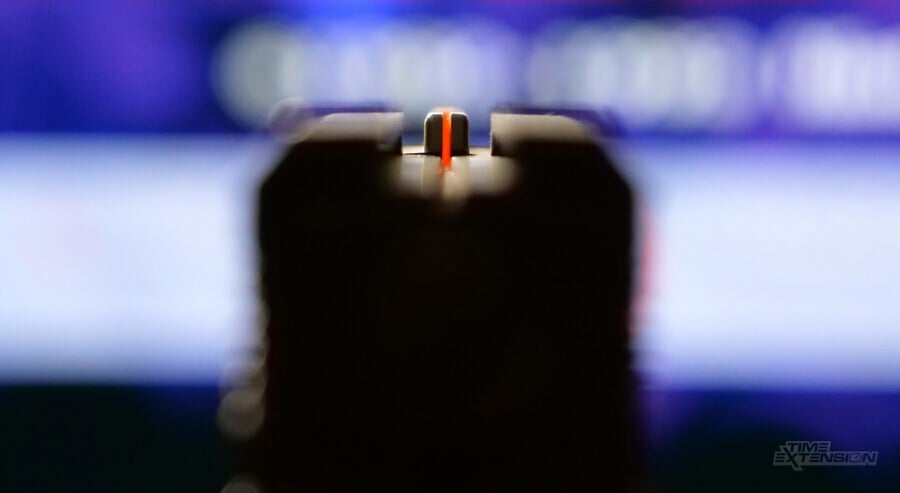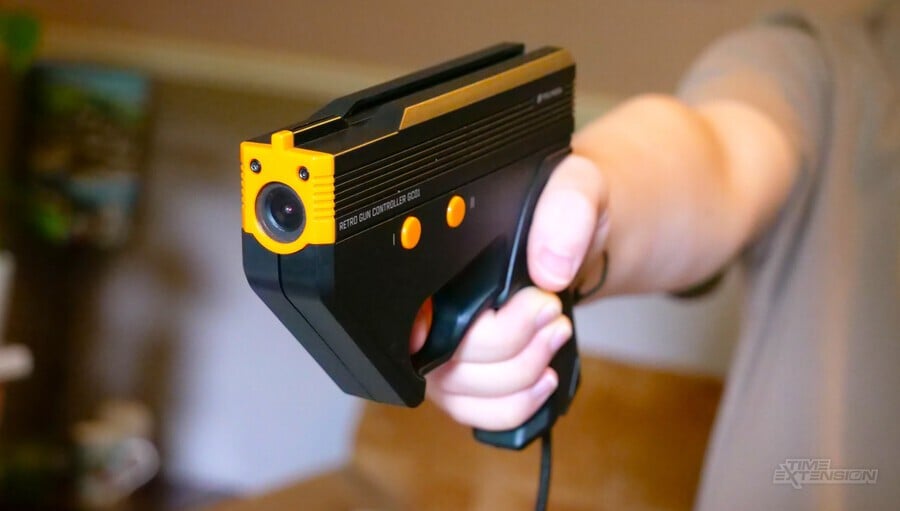
As somebody who has limited space beneath their television (and an increasingly limited amount of spare time to play video games), Playmaji's Polymega modular retro gaming system was a breath of fresh air for me when it arrived a few years ago. Here was a system which could house my curated physical gaming collection (in digital form) on a single, unified hardware platform, complete with creature comforts such as save states, HD output and the ability to use original accessories.
The fly in the ointment with Polymega is the amount of time it has taken Playmaji to fulfil orders; I was lucky enough to get an early review unit (albeit one that isn't the final production spec and has already been back to Playmaji's HQ once for a firmware update that couldn't be applied over the internet), but my Hookshot Media colleague, Ant Dickens, ordered one and had to wait a considerable amount of time before his system arrived. Others are apparently still waiting.
Back in 2021, Playmaji announced what was, for many people, the most exciting element of the whole Polymega setup: the $110 GC01 gun controller. As even the most casual of retro gamers will be aware, old-school light guns require CRT TV sets to function and are therefore totally incompatible with modern flat-screen televisions. Polymega's gun promised to bridge this technological divide and make classics such as Duck Hunt, Time Crisis and House Of The Dead playable on modern-day sets; a dream come true for long-suffering light gun fans who have seen the genre wither on the vine for the past few decades.
The big issue was that, despite taking pre-orders back in 2021, Playmaji is only now sending out finished GC01 guns – a perfect example of how Polymega's goodwill has been diminished by hardware delays and lack of communication.
The good news is that the GC01 is finally here, and – very minor issues aside – lives up to its potential.
Polymega GC01 Gun Controller Review: Design & Build Quality
The first thing you notice when removing the GC01 from its packaging is that it's small – much smaller than the likes of Saturn's Virtua Gun or PS1's GunCon. It's also significantly smaller than the Sinden light gun, which contains the same optic positioning technology in order to work with modern flatscreen TV sets (Playmaji has licensed the tech from British developer Andy Sinden).
At first, I thought I'd struggle with this, but the size feels perfect. It might not look like a real gun – something I'm not bothered by in the slightest, I have to say – but it's comfortable, not too bulky and has a better centre of gravity than other guns, which have longer barrels. Arm ache is very real problem for me when playing with light guns, and while it's still present here, it seems to be less of an issue with the GC01 – perhaps due to its short and stocky design.
Another thing you'll no doubt notice is that the GC01 is really lightweight, too; while the Sinden has a fair amount of heft to it, the GC01 feels relatively 'empty' in comparison; the reason it's so light is that Playmaji has scaled down the scope of the internal tech; there's no force feedback, something that was offered as an optional upgrade on the Sinden (but, it should be noted, not present on any of the supported systems). The Sinden's pump-action functionality has also been sacrificed. Along with its diminutive dimensions, the lightness of the gun arguably helps avoid arm strain – but the build quality leaves something to be desired. There's also a slight 'flex' on the handle when you grip it really tightly, which makes it feel a little cheap.
In terms of controls, there are four action buttons (two on either side of the gun), a trigger and a small analogue joystick on the end facing the player. The latter is used to access Polymega's main menu (by pushing down on the stick) and navigate it, and replaces the side-mounted D-pad that was present on the original Sinden gun.
The four action buttons also feel somewhat cheap and clicky, which possibly suggests the GC01 hasn't been designed with a premium approach. Compared to the updated Polymega wireless controller, this feels like it has come from a totally different factory, and not in a particularly positive way. The trigger feels robust enough, however, and that's what's going to be getting the majority of use.
The GC01 connects to the Polymega via an 8-foot-long cable and a USB-A plug – just like the Sinden gun. A wireless option would have been nice, but this would have added latency to the mix. Depending on your AV setup, 8 feet might be too short for you to use the GC01 comfortably, but it was plenty long enough for me.
Polymega GC01 Gun Controller Review: Performance
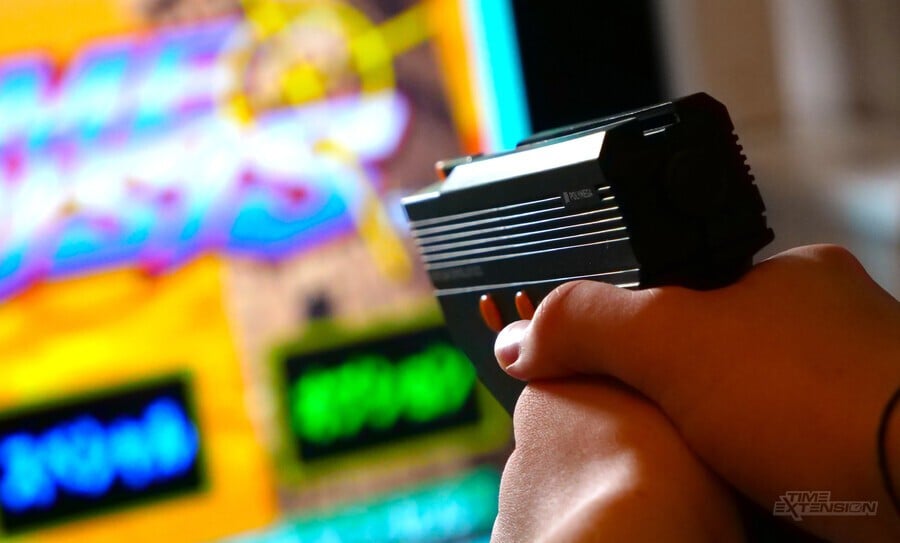
Build quality complaints aside, the GC01 performs much better than I was expecting – and it's not like I had low hopes, as I've already tested the Sinden and found it to be excellent, as long as the lighting conditions are right.
Like the Sinden, the GC01 uses a camera mounted in the barrel of the gun to monitor what's happening on the screen during play. A blue border surrounds the play area, giving the camera a point of reference when tracking the on-screen action. It uses this setup to judge whether shots are accurate or not. The blue border looks a little ugly, I have to say, but without it, this piece of tech simply would not work.
The precision offered by this system is truly impressive – there's a bit of tinkering required in order to find the optimal position within the room (if you're too close, and the GC01 can't 'see' the screen border), but when you've discovered the sweet spot, it's remarkable how well the gun performs across a wide range of games.
You can calibrate the GC01 at any point from the Polymega's menu, but I found the gun was impressively precise right out of the box; the only time I needed to recalibrate was when I switched position (I alternated between sitting down and standing up, for example), or changed the room I was in and therefore the TV I was using.
The biggest issue I faced is one I also encountered with the Sinden; my TV is in a bay window, so there's a lot of light cascading directly into the GC01's camera. This plays havoc with accuracy and responsiveness; the gun often fails to even register on the screen, making it impossible to play. However, once I'd shut the curtains and plunged the room into darkness, performance was impeccable.
Also, when playing on different TVs in the house – ones which don't have direct sunlight behind them – the issue vanishes. It's something that's relatively easy to overcome, then, but if you're playing in a large room where you don't have granular control over the amount of ambient light, you might find it a struggle.
It's also worth noting that the GC01 works perfectly fine with smaller portable LCD screens. It's also worth mentioning that the Sinden is not compatible with the Polymega, despite the two guns sharing the same tech.
Polymega GC01 Gun Controller Review: Supported Games
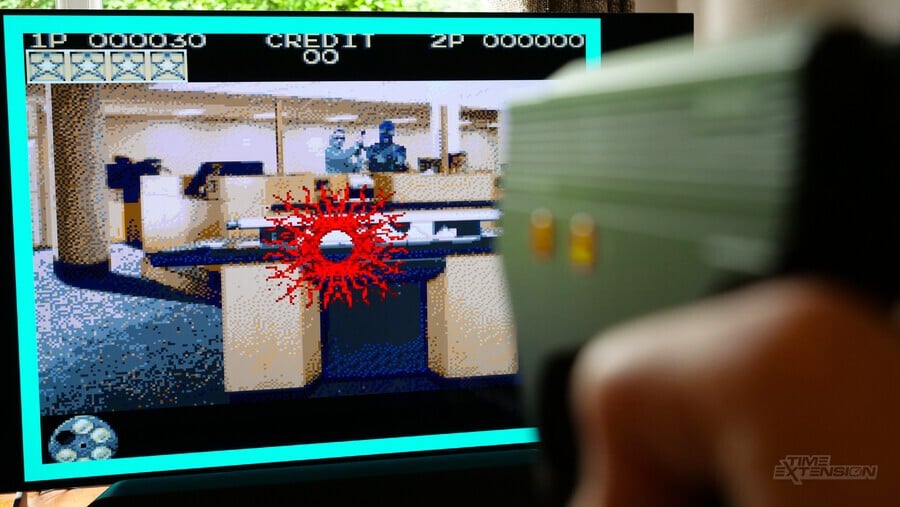
The GC01 is intended to work with any light gun-compatible game across all of the supported systems on Polymega, imitating peripherals such as Saturn (Virtua Gun / Stunner), PS1 (Justifier, Guncon), SNES/SFC (Super Scope), MD / Gen / SCD / MCD (Menacer, Justifier) and NES/FC (Zapper).
While some games, such as Time Crisis and Resident Evil: Survivor, feature a short calibration mode relating to optimising the aim of the PS1's unique GunCon controller, most of the games I tried worked with the GC01 as soon as they booted up – with one notable exception.
While Playmaji lists the SNES Super Scope as being compatible with the GC01, the two games I was able to try – Battle Clash and Yoshi's Safari – refused to register shots from the light gun. I've contacted Playmaji and will update this review when I hear back; I may be doing something straightforward incorrectly, but neither game would allow me to progress past the title screen.
Below is the confirmed list of compatible games, taken from the Polymega site:
NES/FC
- Duck Hunt NES, NES-E, FC
- Freedom Force NES
- Gumshoe NES, NES-E
- Hogan's Alley NES, NES-E, FC
- Operation Wolf NES
- Wild Gunman NES, NES-E, FC
- Trick Shooting NES, NES-E
- Gotcha! NES
- Laser Invasion / Gun Sight NES, FC
- Mechanized Attack NES
- Shooting Range NES
- To The Earth NES, NES-E
- Space Shadow FC
SNES/SFC
- Battle Clash / Space Bazooka SNES, SNES-E, SFC
- Bazooka Blitzkrieg / Destructive SNES, SFC
- Lethal Enforcers SNES, SNES-E, SFC
- Metal Combat: Falcon's Revenge SNES, SNES-E
- Operation Thunderbolt SNES
- Super Scope 6 SNES, SNES-E, SFC
- Terminator 2: The Arcade Game SNES, SNES-E, SFC
- Tin Star SNES
- X-Zone SNES, SNES-E, SFC
- Yoshi's Safari / Yoshi no Road Hunting NES, SNES-E, SFC
Genesis/Mega Drive
- Lethal Enforcers GEN, MD-E, MD-J
- Lethal Enforcers II: Gun Fighters GEN, MD-E
- Menacer 6-Game Cartridge GEN, MD-E
- Terminator 2: The Arcade Game GEN, MD-E, MD-J
- Bodycount MD-E
Sega CD/Mega CD
- Corpse Killer SCD, MCD-E, 32XCD
- Crime Patrol SCD
- Lethal Enforcers SCD, MCD-E, MCD-J
- Lethal Enforcers II: Gun Fighters SCD, MCD-E, MCD-J
- Mad Dog Mcree SCD
- Mad Dog II: The Lost Gold SCD
- Snatcher SCD, MCD-E
- Who Shot Johnny Rock SCD
Saturn
- Area 51 SAT, SAT-J
- Chaos Control / Chaos Control Remix SAT-E, SAT-J
- Crypt Killer / Henry Explorers SAT, SAT-J
- Daisuki SAT-J
- Death Crimson SAT-J
- Die Hard Trilogy SAT, SAT-E, SAT-J
- The House of the Dead SAT, SAT-E, SAT-J
- Maximum Force SAT, SAT-E
- Mighty Hits SAT, SAT-E
- Policenauts SAT-J
- SCUD SAT
- Virtua Cop SAT, SAT-E, SAT-J
- Virtua Cop 2 SAT, SAT-E, SAT-J
- こちら葛飾区亀有公園前派出所 中川ランド大レース!の巻 SAT-J
- 人造人間ハカイダー ラストジャッジメント SAT-J
PS1
- Area 51 PS
- Cellophane (Serofans) PS-J
- Die Hard Trilogy PS
- Die Hard Trilogy 2 PS
- Elemental Gearbolt PS, PS-J
- Extreme Ghosbusters: The Ultimate Invasion PS-E
- Ghoul Panic / Oh! Bakyuuun PS-E, PS-J
- Gunbare! Game Tengoku - The Game Paradise 2 PS-J
- Gunfighter: Legend of Jesse James PS
- Guntu: Western Front June, 1944 PS-J
- Judge Dredd PS, PS-E
- Lethal Enforcers I & II / Deluxe Pack PS, PS-J
- Maximum Force PS
- Mighty Hits PS-J
- Mighty Hits Special PS-E
- Moorhuhn 2 PS-E
- Moorhen 3: Chicken Chase PS-E
- Moorhuhn X PS-E
- Point Blank / Gunbullet PS, PS-J
- Point Blank 2 / Gunbarl PS, PS-J
- Point Blank 3 / Gunbalina PS, PS-J
- Project: Horned Owl / Horned Owl PS, PS-J
- Puffy no P.S. I Love You PS-J
- Rescue Shot / Rescue Shot Bubibo PS-E, PS-J
- Resident Evil: Survivor / BIOHAZARD Gun Survivor PS-E, PS-J
- Silent Hill PS, PS-E, PS-J
- Simple 1500 Series Vol. 024 - The Gun Shooting PS-J
- Simple 1500 Series Vol. 063 - The Gun Shooting 2 PS-J
- Star Wars Rebel Assault II: The Hidden Empire PS, PS-E, PS-J
- Time Crisis PS, PS-J
- Time Crisis: Project Titan PS, PS-J
Polymega GC01 Gun Controller Review: Conclusion
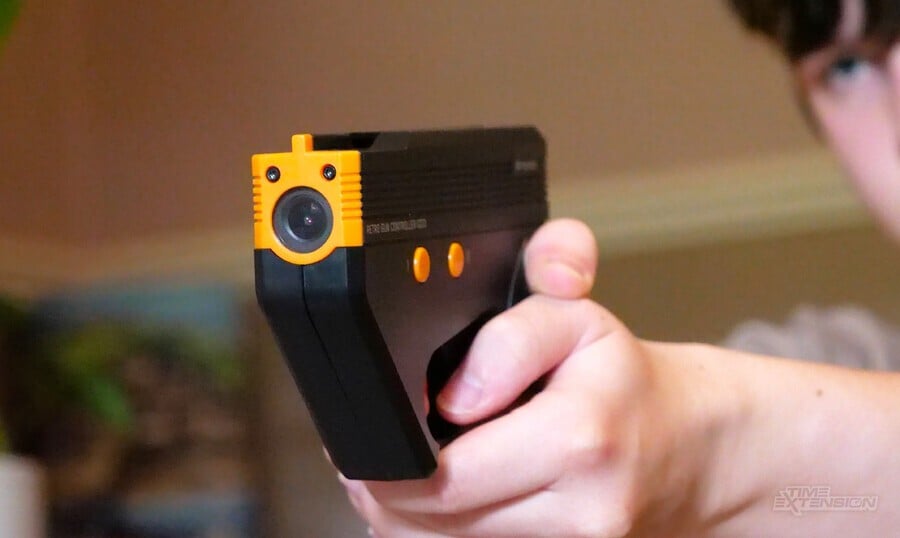
Nobody should have to wait four years for a product they've paid over $100 for, and the GC01's painful route to market is hard to defend, even in light of the final product being of such a high standard.
When Playmjaji opened pre-orders back in 2021, the GC01 was at the vanguard of a tech revolution – but since then, the Sinden has become a more mature product and is supported by both PC and MiSTer FPGA – and to make matters worse, other rivals are appearing, such as the AI-powered G’AIM’E light gun.
As a result of the delay, the GC01's market has narrowed a little – but that doesn't take away from the fact that it's still a fantastic piece of kit, and another feather in Polymega's cap.
Sure, the build quality isn't quite as good as I'd like, the lighting conditions in the room need to be perfect to ensure optimal performance and the blue border around the game area might be off-putting for some, but the fact that we now have another viable option when it comes to playing light gun games on modern-day LCD and LED TVs is very welcome indeed – especially as Polymega supports so many retro systems and therefore serves as a gateway to playing some of the most famous light gun titles of the past few decades.
Now, all we need is for Playmaji to get better at supplying potential customers not just with the GC01 but also the base Polymega console, and the whole venture will take a massive step towards the sustained commercial viability it deserves.
